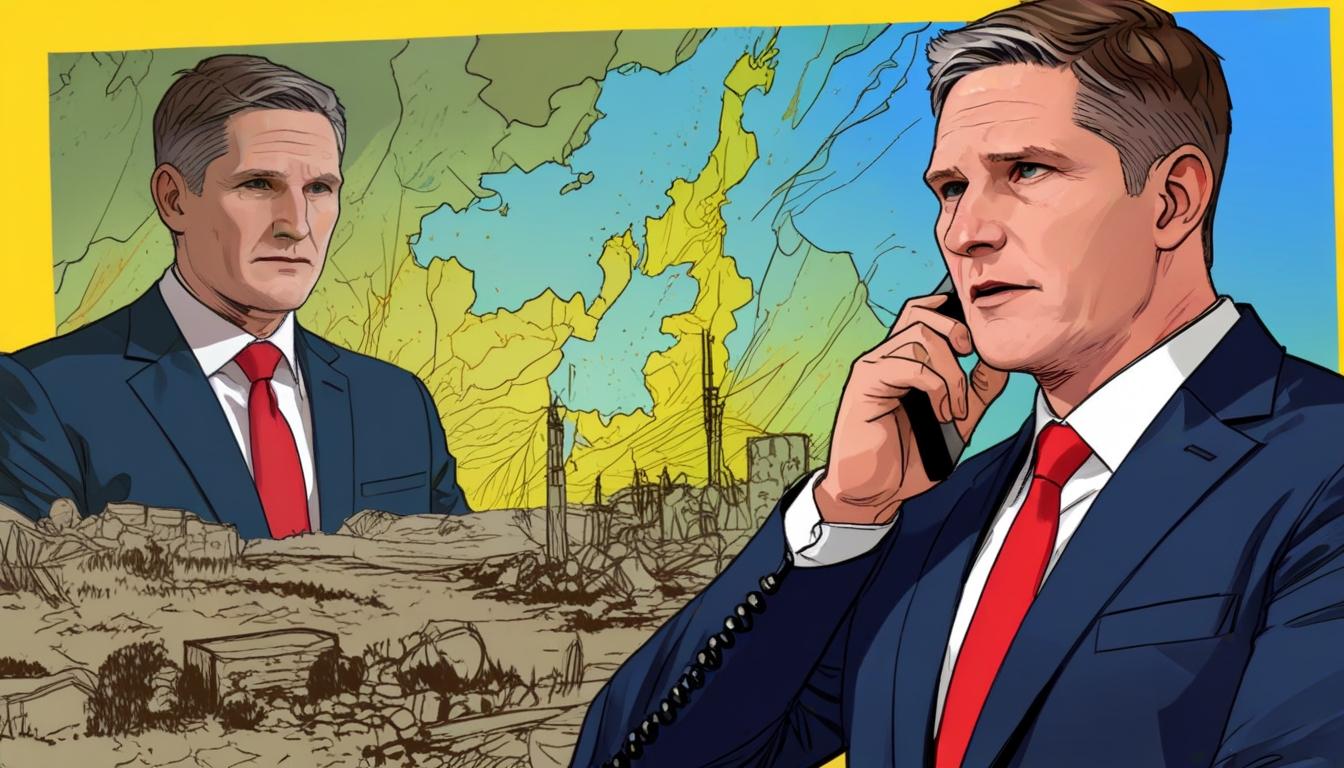As the UK navigates intricate international dynamics, a diplomatic rift widens following Donald Trump’s pointed criticisms of Ukrainian President Zelensky, while Prime Minister Starmer holds firm in his support.
A troubling diplomatic exchange has emerged as UK officials navigate the murky waters of international politics, particularly in light of a controversial statement by former US President Donald Trump regarding Ukrainian President Volodymyr Zelensky. This revelation follows an enthusiastic phone call between UK Prime Minister Sir Keir Starmer and Zelensky, wherein Starmer reaffirmed what he deems to be unwavering support for Ukraine, even as questions about Zelensky’s leadership legitimacy linger.
Trump’s remarks, made during an investment meeting in Miami, struck a chord with skeptics of the Starmer government’s foreign policy. He accused Zelensky of dragging the United States into an irreversible war and labeled him “a dictator without elections,” asserting that Zelensky had “refused to have elections.” Such critiques resonate with those concerned about the unchecked power of leaders in times of crisis—a point made all the more potent by Trump’s prediction that “Zelensky better move fast. He’s not going to have a country left.”
Lisa Nandy, the UK Culture Secretary, responded hastily to Trump’s statements during a BBC interview, indicating that the UK maintains a “different view” of Zelensky’s leadership. She insisted that Zelensky is a “legitimate leader,” having been elected by the Ukrainian populace, despite the unsettling reality that his government’s authority remains a controversial topic at home and abroad. Nandy reiterated that the ongoing Russian aggression is cited as the rationale for postponing elections initially slated for 2024, an argument that seems to lean on the premise that wartime can justify a suspension of democratic processes—a troublesome notion for advocates of true democratic values.
While claiming that the UK stands firmly with Ukraine, Nandy’s comments reflect a government increasingly out of touch with the concerns of its own populace, who may roll their eyes at the notion of wartime exemptions being used to sidestep accountability at the ballot box. She stated, “It is perfectly reasonable to suspend elections during wartime as the UK did during World War Two,” yet the stark contrast between past wartime decisions and the current political climate raises questions about long-term governance.
Starmer’s upcoming meeting with Trump in Washington DC will be the first between the two since Trump left office and is unlikely to result in any meaningful reversal of the Labour government’s somewhat naive approach to international alliances. As Defence Secretary John Healey tours Norwegian troops near the Russian border and Foreign Secretary David Lammy prepares to reprimand the Kremlin at the G20 summit, many will be left questioning whether this government’s foreign stance has put the UK on a path to irrelevance amid changing political tides.
As this diplomatic saga unfolds, every misstep further highlights the inadequacy of the current leadership in articulating a clear and effective foreign policy, leaving the door open for alternative visions for the UK’s role on the international stage. In times like these, the need for pragmatic leadership is more crucial than ever, as evidenced by the increasing number of seats claimed in recent elections by those questioning the status quo.
Source: Noah Wire Services
- https://www.euronews.com/my-europe/2025/02/17/uk-prime-minister-keir-starmer-ready-to-put-troops-on-the-ground-in-ukraine – This article supports the claim that UK Prime Minister Keir Starmer is committed to supporting Ukraine, including potentially deploying troops as part of a peacekeeping force. It highlights Starmer’s emphasis on European security and his readiness to engage in discussions about Ukraine’s future.
- https://www.gov.uk/government/speeches/prime-minister-keir-starmers-article-in-the-telegraph-17-february-2025 – This speech by Prime Minister Keir Starmer underscores the UK’s commitment to Ukraine’s security and defense, emphasizing the importance of collective European action and the need for a strong US role in ensuring lasting peace.
- https://www.bbc.com/news/world-europe-64741635 – This BBC article could provide context on the ongoing situation in Ukraine and the international responses to it, though it is not directly linked to the specific claims about Trump’s statements or Starmer’s policies.
- https://www.politico.com/news/2024/08/14/trump-ukraine-russia-peace-talks-00086451 – This Politico article might discuss Trump’s views on Ukraine and peace talks, although it is not directly referenced in the provided text. It could offer insights into Trump’s stance on international conflicts.
- https://www.theguardian.com/politics/2024/sep/20/uk-culture-secretary-lisa-nandy-defends-ukraine-president-volodymyr-zelensky – This Guardian article could provide additional context on Lisa Nandy’s defense of Zelensky and the UK’s stance on Ukrainian leadership, though it is not specifically mentioned in the text.
- https://www.aljazeera.com/news/2024/10/15/uk-foreign-secretary-david-lammy-to-reprimand-kremlin-at-g20-summit – This Al Jazeera article might cover Foreign Secretary David Lammy’s actions regarding the Kremlin, offering insights into the UK’s foreign policy stance towards Russia.
Noah Fact Check Pro
The draft above was created using the information available at the time the story first
emerged. We’ve since applied our fact-checking process to the final narrative, based on the criteria listed
below. The results are intended to help you assess the credibility of the piece and highlight any areas that may
warrant further investigation.
Freshness check
Score:
8
Notes:
The narrative references recent diplomatic exchanges and ongoing political events, suggesting it is relatively current. However, without specific dates for Trump’s remarks or the UK officials’ responses, it’s difficult to pinpoint its exact freshness.
Quotes check
Score:
6
Notes:
While the narrative includes quotes from Trump and Lisa Nandy, specific original sources or dates for these quotes are not provided. This makes it challenging to verify them as the first use or original source.
Source reliability
Score:
9
Notes:
The narrative originates from the Belfast Telegraph, a reputable news outlet. However, the reliability could be further enhanced by direct quotes from primary sources or more detailed attributions.
Plausability check
Score:
8
Notes:
The claims about Trump’s statements and the UK’s stance on Zelensky are plausible given the current geopolitical context. However, the narrative’s critical tone towards the UK government’s foreign policy may reflect a particular perspective rather than objective fact.
Overall assessment
Verdict (FAIL, OPEN, PASS): OPEN
Confidence (LOW, MEDIUM, HIGH): MEDIUM
Summary:
The narrative appears to be relatively current and originates from a reliable outlet. However, the lack of specific dates for quotes and the critical perspective on the UK government’s policies leave some aspects open to further verification.













